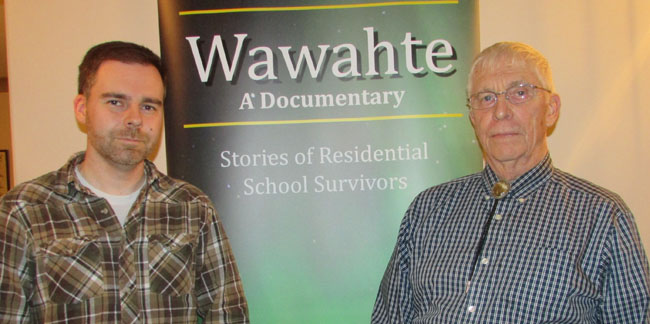Residential School story ‘Wawahte’ on crowd-funding for translation help

By Carrie MacKenzie
KINGSTON – Robert P. Wells, author of the book “Wawahte” and John Sanfilippo the director and producer of the documentary film on Indian Residential Schools “Wawahte” are embarking on new venture. The book was published in 2012 by Trafford Publishing and then by Freisen Press in 2016. The documentary film premiered on Feb. 27 at the Kingston Canadian Film Festival after about a year in production. Now Mr. Wells and Mr. Sanfilippo want to do a French language voice over of this collection of powerful stories. To do this, they are going to launch a crowd funding campaign with the goal of raising $17,000.00 to finance this undertaking.
This campaign will make use of the crowd funding website Kickstarter and will run through the month of November. Then, work will begin on the production of the French version of the “Wawahte” documentary film with the final product hopefully being available in March, 2017. There will be a promotional video on the Kickstarter site, wawahte.com and YouTube that talks about this new endeavour. Social media sites like Twitter and Facebook will also be used to spread the word about this project. In addition to all of this, word of mouth will be important. As Mr. Sanfilippo put it, he and Mr. Wells are going to “tell everyone one we know” about this venture and encourage them to tell all of their friends, too.
People can currently watch the English version of “Wawahte” on the website, Wawahte.com and also purchase a copy of the book. In addition, the public will be able to find information about the French version of the film on wawahte.com. To coincide with the launch of this crowd funding drive, the English version of the film has been made available on YouTube with links to the crowd funding site and wawahte.com. There will also be content from wawahte.com on the crowd funding website. There will be “links all over the place” according to Mr. Sanfilippo.
The goal of the book and both the English and French versions of the documentary film is to promote awareness and in the words of Mr. Sanfilippo to “inspire discussion and thought and reflection” and educate people about Residential schools and their devastating impact on Indigenous society. The effects of the Residential school system can be felt, even today. To this end “Wawahte” has been screened at a number of schools in Kingston, Ontario and over the summer of 2016 it was shown to a group of enrichment students at Queen’s University.
“Wawahte,” the book and film came out of a promise Mr. Wells made to an Elder, his friend Moochum Joe when he was nine years old. This promise was to bring attention the negative treatment of Canada’s Indigenous peoples. The result of this pledge was published 65 years later in 2012. Before writing “Wawahte” Mr. Wells talked to those whose stories are included in the book. He told them that “one thing I didn’t want to do, if they agreed, I didn’t want to write an angry book because I knew that mainstream Canadians wouldn’t read it. And so the book is not angry, there’s no blame, it just tells the story.” Mr. Wells then approached Mr. Sanfilippo the owner of Tyton Sound located in Kingston about producing an audio book. The conversation later turned into a discussion about how to make the book into a movie. This exchange resulted in the film “Wawahte” which has been televised and shown in public and private venues with one or two screenings a month since its premier.
Having a French version of this poignant documentary film will only increase its impact, which can only lead to reconciliation and healing. Those who wish to donate to this endeavour they can do so at (https://www.kickstarter.com/projects/37155926/wawahte-residential-schools-documentary-version-fr?ref=email and watch the English version of the documentary at https://www.youtube.com/watch?v=oGrJNUCQ-r4.

